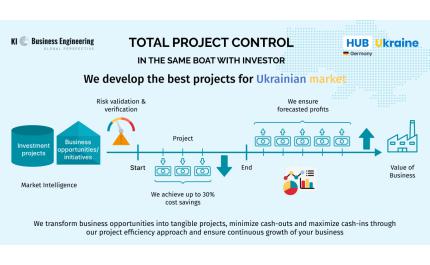Motivational part.
Expanding a business in Germany can be chaotic and stressful. It requires significant investment and it should be noted that both the German market and the DACH region are extremely competitive. But the situation is not hopeless. There are ways for your business to enter and grow in the German market. The right strategy and planning for a successful entry of your product or service into the German market is a major factor for growth. High competition and an unknown, alien business environment should not be a deterrent to your business entering the German market. You can only imagine the impact your initiative will have on the image of your company in the eyes of competitors if your project is successfully implemented. We know how to implement your project and will share it with you in this article.
This article explains:
- OPPORTUNITIES AND CHALLENGES FOR UKRAINIAN COMPANIES IN THE GERMAN MARKET
- RESOURCES AND CRITERIA FOR SUCCESSFUL PARTNERSHIP WITH GERMAN COMPANIES
- A GUIDE TO DEVELOPING YOUR BUSINESS IN THE GERMAN MARKET
- OUR CONCEPT FOR DEVELOPING YOUR BUSINESS IN THE GERMAN MARKET
- TERMS OF COOPERATION IN THE FORM OF A STANDARD COMMERCIAL REPRESENTATIVE (AGENT) AGREEMENT IN
1. OPPORTUNITIES AND CHALLENGES FOR UKRAINIAN COMPANIES IN THE GERMAN MARKET
The German market offers opportunities for foreign companies, here are the main ones:
- Powerful and globally positioned
- Cheap credit resources
- High purchasing power of consumers
- Access to the single European market
- Stable economic development
These are some of the main challenges that Ukrainian companies may face in Germany:
- Language barrier: German is the predominant language in Germany. And while many people speak English, the language barrier can make it difficult to do business, especially in areas where direct communication with customers or business partners is required.
- Cultural differences: Germany has its own cultural norms and business practices that may differ from those in other countries. A deeper understanding of German business culture can be important for foreign companies to succeed.
- Bureaucracy and regulation: Germany has a complex system of regulations and bureaucracy that can make it difficult for foreign companies to adapt and operate effectively. This applies in particular to areas such as taxes, labor laws and certification.
- Competition: The German market is often highly competitive, especially in industries such as automotive, technology and engineering. Foreign companies may have to compete with well-established German companies that have many years of experience and a strong network.
- Consumer preferences: German consumers have specific preferences and expectations for products and services. Foreign companies may need to adapt their products and marketing strategies to accommodate these preferences.
- Logistics and distribution: The logistics infrastructure and distribution requirements may vary by industry and region. Foreign companies may need to adapt their supply chains and distribution channels to the realities of the German market.
- Market entry strategy: Choosing the right market entry strategy is crucial to the success of a foreign company in Germany. This may include setting up your own branch, working with local partners, or using distribution channels.
Careful market analysis and targeted preparation can help overcome challenges and maximize opportunities.
2. RESOURCES AND CRITERIA FOR SUCCESSFUL PARTNERSHIP WITH GERMAN COMPANIES
There are several ways to bring a company to the international market. The internationalization of a company often begins with the export of goods or services abroad. In terms of commonly accepted forms of internationalization, the capacity of resources (primarily financial) and the scope of management increase in the following sequence:
- Exports
- Licensing
- Franchising
- Joint venture
- Branch
- Subsidiary
Exporting requires the least resources, while managing a subsidiary or branch abroad requires the most. All of the above forms of doing business abroad can be implemented with our concept.
The situation through the eyes of German partners
Potential foreign partners and buyers do not have a deep understanding of your company, its history, know-how, philosophy, relationships with stakeholders, owners, and suppliers, which are so important for building trusting partnerships. In short: the key to business is to be where your customers and partners are. Regardless of how high the quality and competitiveness of your products are, potential customers tend to have regular suppliers who have proven their trust and loyalty and, importantly, are located in the same country within direct immediate access. From the client's point of view, each new partnership is a blank slate with many unknowns. That is why there are prejudices and understandable doubts based on the risk assessment of business relations between German partners and Ukrainian ones. A distinction should be made between national risks that apply to the entire country and those that are specific to a particular supplier. The general national ones include economic stability, inflation, development dynamics, legal regulation of customs, including customs and payment, etc. Specific, inherent in a particular company. From the perspective of partners and customers in Germany, cooperation with foreign suppliers is associated with:
- A greater need for coordination and coordination due to the distance to the supplier.
- Time factor. When delivery times are tight, delays are more likely than when working with local suppliers.
- Less planning and control. In the partner's domestic German market, information about its players is available and known. It is provided both by the clients themselves and through governmental organizations created to increase transparency in reporting and the relationship between company owners and management.
- Significant administrative and customs barriers compared to local suppliers.
- Legal, linguistic and cultural differences that can lead to misunderstandings and escalation of conflict situations.
These points show that even if you have information and financial resources, you need to actively communicate with your German partners in order to build a picture of trusting relationships.
3. A GUIDE TO DEVELOPING YOUR BUSINESS IN THE GERMAN MARKET
- Creating and implementing the concept of easy and flexible development. The right concept should have a balance. On the one hand, it should provide an opportunity to be present or touch the market, study it from the inside, collect reliable data, etc. On the other hand, it should be cost-effective. It should refrain from significant expenditures and investments until the picture of revenues and expenses in the target market is fully understood and pragmatically justified. We advise you to have a partner in the target market in Germany in order to have up-to-date access to market information and to build practical ways for expansion.
- The focus on the "cutting-edge productis to collect real feedback from potential partners. To enter the international market, you first need to adopt a clear market strategy for promoting your products or services. This means developing a "cutting-edge" product and its sales channels, and is especially important for the European markets, particularly Germany, Austria and Switzerland. It is known that the level of competition here is very high, as these markets are open to businesses from all over the world. For this reason, testing the product in the target market has a significant impact on reducing financial risks. Customer feedback is the best answer to the question of whether a product meets market requirements
- The preparatory stage is the presentation of the product in the target market to raise awareness. It should be remembered that local players always have an advantage over foreign ones because they are already known to customers. To successfully present your product or service on the German market, you need a preparatory stage for promotion. This will help you learn about the reaction of the market and potential partners and direct it to improvement and prompt adjustments. These expenses should be made when you have the first customers in the target market. Bill Gates also said that dissatisfied customers are the best source for product and business development. We recommend having a sales partner in the target market in Germany who can represent your product on the market.
- Conducting the first sales. Use partnerships for realization. We have described how to do this in detail in our concept of cooperation for your entry into the German market and growth at DACH in the next section.
4. OUR CONCEPT FOR DEVELOPING YOUR BUSINESS IN THE GERMAN MARKET
Entering a foreign market can be difficult and expensive. KI Business Engineering offers an innovative solution with a representative office in Germany and at minimal cost.
WHAT WE DO:
We facilitate digital transformation and business development for our corporate clients in Germany. So don't miss the opportunity to become a valuable part of our partner pool.
OUR MOTTO: WE WORK TOGETHER - WE GROW TOGETHER
FOCUS ON COMPETITIVE ADVANTAGES AND TERMS OF COOPERATION
Let's be open and honest. Almost everyone can enter the market, but not everyone can successfully develop and make a profit. Therefore, only after careful pre-selection, analysis of potential and readiness to adapt your product or service to the new market environment can we start cooperation.
We do not operate on the principle of mass participation. Our goal is to form a limited pool of companies with real competitive advantages and unique know-how that are valuable in the target market. Only then will we be able to scale your business.
OUR CONCEPT IS TWO-STAGE:
- Create awareness (good image) of your product or service on the German market.
- Integrate your business into the target market.
Problems solved in cooperation with KI Business Engineering:
- Lack of information because you don't know where your development opportunities really lie.
- High costs: Avoid overpaying for office space, staff, and other overhead costs required when entering a foreign market.
- Lack of experience: market specifics, lack of physical presence, insufficient knowledge of local laws and regulations.
- Difficulties in attracting customers: find customers at minimum cost by maximizing the distribution of your product.
- Financial risks: Prepare accordingly and minimize the risk of financial losses by entering the market in advance and making sure your product is ready to start generating revenue quickly.
WHAT WE OFFER:
- Digital and direct presence: We will ensure that your product or service is visible to further promote and gather information in your target market.
- Attracting clients: We offer our services by networking and participating in business events and exhibitions to attract clients and projects.
- Analytics and constant communication with partners in Germany: Collecting information, mapping and analyzing customer requirements to develop effective strategies.
- Support and office administration: Direct accessibility, keeping in constant contact with customers in Germany and DACH as well as office administration - all inclusive!
- Integration into the German market: We will find partners that are best suited for your business, who will support and promote your business even after you have opened a representative office in the target market.
YOUR BENEFITS FROM COOPERATION:
- PRODUCT FOCUS to expand sales by focusing on developing distribution and bringing products or services to potential customers
- SAVING 70-80% of COSTS in the first year of operation in the German and DACH markets. Goal: to prepare for the opening of their own office by attracting the first customers with KI Business Engineering
WHAT DO YOU GET?
- PRODUCT REDESIGN & BRANDING: Increasing the added value of a product or service
- DIRECT & DIGITAL CUSTOMER ACCESS: Constantly communicating with customers in their language, both literally and figuratively
- NEW ORDERS & PROJECTS: We generate orders - you execute projects
- MARKET INTEGRATION: preparing and creating your company's presence on the market and connecting it to the network of partners
5. TERMS OF COOPERATION IN THE FORM OF A STANDARD COMMERCIAL REPRESENTATIVE (AGENT) AGREEMENT IN GERMANY
1
The represented company entrusts the commercial agent with exclusive representation for the provision of services in the area agreed upon by the parties (here, for example, design, IT, individual products, etc.). If there are any geographical restrictions agreed upon by the parties, they should be specified in this section
The represented company is obliged to list in the appendix to this agreement all clients with whom it already maintained ongoing business relations at the time of the agreement's commencement, including the relevant turnover achieved with these clients in the last 12 months prior to the agreement's commencement.
2
A commercial agent receives a commission from the company it represents in the form of a percentage of the invoice amount, excluding VAT, for all transactions concluded with future customers referred by the commercial agent.
In addition to the commission and any other remuneration and compensation, the commercial agent receives the statutory amount of value added tax payable if he is obliged to collect it from the company he represents by law. VAT paid to a commercial agent is a deductible value added tax for the company it represents. The accrued VAT is payable together with the commission and any other remuneration and compensation.
If the sales volume does not reach at least (amount to be specified in Euros) for three consecutive months, the sales agent shall receive a monthly fixed remuneration of (amount to be specified here in Euros), which shall be set off against the sales-related commissions payable in the respective month. (This clause is subject to separate agreement. It ensures that the commercial agent (representative) in Germany receives the minimum monthly remuneration at the beginning of his/her activities).
Additional services provided by a commercial agent shall be paid separately after the parties have previously agreed on the amount of remuneration.
The represented company shall provide the commercial agent with a commission report for each calendar month, no later than the 15th day of the following month, for deliveries made in that calendar month. The commission to which the commercial agent is entitled under this agreement shall be paid after settlement.
The commission is also payable if the transaction is not executed or is not executed as agreed. However, this does not apply if the company that represents can prove that the non-performance was due to circumstances for which it is not responsible.
3
The commercial agent is obliged to protect the interests of the company he represents with the care of a prudent businessman, provide it with the necessary information, in particular, immediately inform it of each commercial intermediation and each commercial transaction and pass on to it the information he receives about the creditworthiness of customers, but not to involve credit agencies.
The goal is also to carry out sales activities (market analysis/testing) and expand and, on this basis, collect product and customer information.
A commercial agent is obliged, to the best of his/her ability, to provide the company he/she represents with all information necessary for the promotion of business, in particular, to inform it immediately about each order.
A commercial agent must not offer third parties services that compete with the agreed services of the company he represents, except in cases of minor overlap.
Competitive goods - a list of product groups (does not have to be in the contract, but the contract partner may be interested in this item).
4
The company we represent is prohibited from entering into an independent agreement with a client referred by a commercial agent that excludes the use of the commercial agent's services. This is to prevent circumvention. This also applies for 12 months after the termination of the contractual relationship with the commercial agent.
In the event of a violation, the represented company is obliged to pay the commercial agent a contractual penalty in the amount of (the amount must be specified here in Euros).
5
The represented company undertakes to support the commercial agent in its activities, in particular to provide it with samples, printed materials and advertising materials in sufficient quantities free of charge. If they are not intended for consumption, these items remain the property of the represented company and must be returned by the commercial agent upon request and at the latter's expense during the term of the contractual relationship, unless, for example, the commercial agent's ability to work would be impaired by the sending of other materials.
The represented company is obliged to immediately provide the commercial agent with the necessary information, in particular, on the acceptance or rejection of the order, as well as on the non-fulfillment of the order that it has mediated or concluded, otherwise the order shall be deemed accepted.
6
The represented company shall provide the commercial agent with a commission report for each calendar month, no later than the 10th day of the following month, for deliveries made in that month. The amount of commission due to the commercial agent, plus VAT, shall be paid together with the report. Any excess commission paid will be accounted for in the next report.
7
A commercial agent is entitled to reimbursement for postal, telephone, facsimile and telegraphic expenses incurred in dealing with the company he represents and in forwarding mail to clients, as well as for further expenses (as specified herein by agreement).
8
In order for the commercial agent to take maximum care of the interests of the company it represents in Germany, the represented company must inform the commercial agent of direct correspondence with customers in its district (a condition that can be agreed upon by the parties), while sending copies to the commercial agent.
9
The represented company assures the commercial agent that it will comply with patent rights, industrial design protection, trademark protection and all other copyright rights, antitrust laws, quality, labeling and packaging regulations and other consumer protection rights.
The represented company shall indemnify the commercial agent against all claims against it and its obligations arising from the breach of the above warranty. If a third party brings an action against the commercial agent in connection with a breach of these provisions, the represented company will pay all advances on legal costs and inform the commercial agent to the extent necessary. In addition, the represented company shall reimburse the commercial agent for all costs incurred in this regard, as well as its own costs.
10
The contractual relationship begins on (specify date) and is valid for a certain period of time until (specify date).
If the agreement was concluded for a certain period, it is extended for the same period unless terminated by registered mail six months prior to its expiration.
If the agreement is concluded for an indefinite period, it may be terminated by either party by registered mail with a six-month notice before the end of the calendar quarter.
11
A sales agent must immediately notify the company he represents if he is unable to provide sales services for more than one week. At the same time, he or she must inform the company he or she represents of how, in his or her opinion, customer support can be provided during his or her absence.
If the commercial agent does not provide customer support, the company it represents may appoint third parties to provide customer service in the contractual territory. The commercial agent must support these third parties to the extent possible, in particular by providing them with data from which to draw conclusions about the tasks required at the time.
This does not affect the contractually agreed remuneration for a period of up to eight weeks from the start of the customer service disruption. Thereafter, the costs of engaging a third party are covered by the commercial agent in the amount of up to 50% of the commission on transactions concluded during the third party's activities.
If the downtime is expected to last more than 6 months, the contracting parties will meet to reach an appropriate agreement that is fair to both parties.
12
Contractual relations are governed by German law.
In the event of disputes arising out of these contractual relations, either party may apply to an arbitration court with the simultaneous appointment of an arbitrator to avoid recourse to the courts of general jurisdiction, or appeal to the courts of general jurisdiction. In both cases, the place of jurisdiction is the registered office of the commercial agent. If a request for arbitration is made and the other party refuses to arbitrate within one week of receiving such a request, jurisdiction shall be transferred to the courts of general jurisdiction. Otherwise, it must also appoint an arbitrator within 14 days of receipt of the request for arbitration. If it fails to appoint an arbitrator within this period, the first party has the right to have a second arbitrator appointed by the Chamber of Commerce and Industry responsible for the commercial agent's location. The arbitrators, in turn, shall elect a chairman. If they do not agree on the arbitrator within 14 days, either party may request the Chamber of Commerce and Industry responsible for the commercial agent's location to appoint an arbitrator. Both parties undertake to comply with the decision of this arbitral tribunal.
If a dispute is already pending in a court of general jurisdiction, an arbitral award is possible only with the consent of both parties.
Amendments to the agreement must be confirmed in writing to be legally binding





